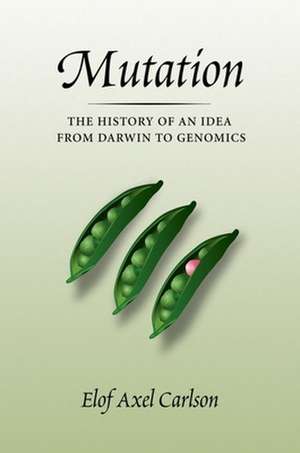Mutation: The History of an Idea from Darwin to Genomics
Autor Elof Axel Carlsonen Limba Engleză Hardback – 31 mai 2011
After exploring Darwin's and Francis Galton's concepts of mutation, Carlson shows how the 1900 rediscovery of Gregor Mendel's experiments let to a discontinuous model of evolution by mutation and how cytological investigations led to the chromosome theory of heredity of classical genetics in which there was random mutation in genes. Carlson details how Mendelian and biometric approaches to heredity and evolution were closely tied and how induction of mutations by radiation and chemical mutagens led to biochemical investigations of gene action, shifting attention to the chemistry of the gene. The interpretation of the gene as DNA and the deciphering of the genetic code then gave rise to molecular interpretations of mutation, views that also impacted evolutionary biology, population genetics, commercial development of plants and animals, and human genetics.
This book shows how generational definitions or assessments of mutation have responded to the technologies added to science and the experiments that abounded with the inquiries of each successive generation. These observations are combined with an exploration of how the nonscientific public has shifted its understanding and concern about mutations over the past 150 or more years. Carlson's historical approach in this bookexamining the evolution of a conceptreveals the way science works, incrementally by small steps of additions and replacements rather than by dramatic, and rare, paradigm shifts.
Preț: 281.10 lei
Nou
Puncte Express: 422
Preț estimativ în valută:
53.79€ • 56.16$ • 44.52£
53.79€ • 56.16$ • 44.52£
Carte indisponibilă temporar
Doresc să fiu notificat când acest titlu va fi disponibil:
Se trimite...
Preluare comenzi: 021 569.72.76
Specificații
ISBN-13: 9781936113309
ISBN-10: 1936113309
Pagini: 163
Dimensiuni: 155 x 234 x 18 mm
Greutate: 0.43 kg
Editura: Cold Spring Harbor Laboratory Press
ISBN-10: 1936113309
Pagini: 163
Dimensiuni: 155 x 234 x 18 mm
Greutate: 0.43 kg
Editura: Cold Spring Harbor Laboratory Press
Recenzii
"Biologists' conceptions of hereditary variation and mutation have undergone considerable shifts since the days of Darwin. In Mutation: The History of an Idea from Darwin to Genomics, Carlson traces those changes in the meaning of the term from genetics at the turn of the 20th century to the emergence of genomics, identifying the researchers involved and how ideas evolved....Carlson includes commentary on human genetics, concern for genetic effects [of] radiation with the development of atomic weapons, and the use of radiation in medicine and industry. He argues that the deployment of new techniques has resulted in the changed meaning of mutation, and in this regard, all readers will agree." The Quarterly Review of Biology
"Carlson trained as a Drosophila geneticist with Hermann Muller surely the person who has done more than any other in advancing our understanding of mutation. But he is also a historian, as witnessed by his previous books...Altogether Carlson's account of the story of mutation is well told...Genetics has been fortunate in having such a wide-range and thoughtful person as Carlson to examine the topic of mutation from a broad perspective, and I greatly hope that this book will not only be enjoyed by geneticists of all kinds, but that it will lead them to Carlson's other equally enjoyable historical books on genetics." Human Genetics
The book is a quick read. It doesn't seek so much to re-educate readers on what mutation is, as it does construct a timeline of how scientists have perceived it through the past couple of centuries....Carlson's book presents a history of the concept of mutation, but also a history of how science itself has changed because of that word's evolution....In seeking to lend a sense of history to a word that is used often in today's science, Carlson succeeds." Genome Web Daily News
"Because Carlson has been directly involved in some of the research, there are details and insights one is unli
"Carlson trained as a Drosophila geneticist with Hermann Muller surely the person who has done more than any other in advancing our understanding of mutation. But he is also a historian, as witnessed by his previous books...Altogether Carlson's account of the story of mutation is well told...Genetics has been fortunate in having such a wide-range and thoughtful person as Carlson to examine the topic of mutation from a broad perspective, and I greatly hope that this book will not only be enjoyed by geneticists of all kinds, but that it will lead them to Carlson's other equally enjoyable historical books on genetics." Human Genetics
The book is a quick read. It doesn't seek so much to re-educate readers on what mutation is, as it does construct a timeline of how scientists have perceived it through the past couple of centuries....Carlson's book presents a history of the concept of mutation, but also a history of how science itself has changed because of that word's evolution....In seeking to lend a sense of history to a word that is used often in today's science, Carlson succeeds." Genome Web Daily News
"Because Carlson has been directly involved in some of the research, there are details and insights one is unli
Descriere
The idea of mutation has changed considerably from the pre-Mendelian concepts of Darwin's generation to today's up-to-the-minute genomic context of mutation. The historical approach taken by this volume reveals the way science works, incrementally by small steps rather than by dramatic, and rare, paradigm shifts.
